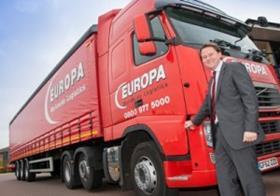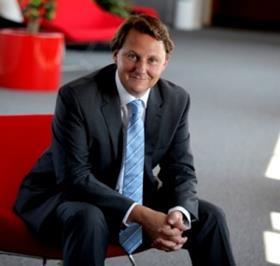Three years ago the industry was shocked as one of the most prominent names in family haulage, the Baxter family’s RH Freight, was snapped up by Swiss logistics giant Kuehne + Nagel for £66.9m. It was a move that came out of the blue, and was concluded within in matter of weeks (if the folklore attached to the deal is to be believed) but it resulted in Andrew Baxter, who alongside his brother Ian ran RH Freight in the footsteps of their father and the company founder Neville, taking a contractually enforced absence from the industry they are associated with.
Fast forward to 2014 and both brothers are back. Ian Baxter has launched freight forwarder Baxter Freight, while younger brother Andrew took a 90% controlling stake in Europa Worldwide Logistics in August 2013. The international groupage specialist, which has its headquarters in Dartford but also operates out of Birmingham, Northampton and Hong Kong (to name but a few), is no stranger to management shake-ups: in 2007 former owners Andrew Kennedy, Grenville Turner and Russell Keep led a management buy-out. But the time had come for Kennedy and Turner to seek an exit strategy (Keep has remained with the business with a 10% shareholding) and Baxter was looking to return to an industry he had spent his whole life in.
“I have always loved this industry,” Baxter tells Motortransport.co.uk in an exclusive interview. “I joined RH Freight when I was 18 and we built the business up. I had a great time doing it. Sometimes it was a little bit complicated, with four sons and one father in the same business together. But there are plenty of examples of that throughout the transport industry! I very much enjoyed it, being on the international side of the industry. You meet a lot of people, you get to see a lot of places and learn a lot of things. I love the industry and I am glad to be back in it.
“At the time we sold RH I had a two year, non-competition clause. In the end it was two and a half years before I came back into the business. But having two years off on holiday was fantastic! But I was 36 years old at the time RH was sold and I could not see that retiring at 36 was very sensible. To have a couple of years off was a great thing to do, but it was great because I knew I was going to go back to work. If it would have been forever it would have been quite disorientating. It would have been the road to ruin.”

One of the main motivations for returning to the industry, outside of the tedium of finding something to do with yourself day-in, day-out, on a two year holiday, was Baxter’s desire to make his own impression. Being part of a family concern, working with his father and brothers, whilst rewarding, ultimately ends up in a series of compromises. Baxter is keen to stress his need to stamp his own way of doing things on an organisation.
“About 18 months before the acquisition I was starting to think about what I wanted to do next, and what were the potential opportunities in the market, in terms of independent, European groupage operators in the UK. There aren’t really that many options. You’ve got Davies Turner, and Europa and people like Hellmann – but they are companies that don’t necessarily want to sell their UK subsidiaries, because they are here for a reason. Davies Turner was not for sale, and there was a possibility with Europa and I pursued it,” he says.
In its most recent set of filed results at Companies House Europa had a turnover of £72.7m for the 12 months ending 31 December 2012 (up from £68m in the previous financial year), making a pre-tax profit of £411,825 (down from £1.6m). In terms of groupage and freight forwarding it makes them one of the most sizable concerns in the UK – Baxter’s target is to make Europa number one in the market.
“My real aspiration was to buy a company that was national and pan-European in its service offering. You can’t do that if you are a £20m a year turnover company. I was very lucky to have such a suitable acquisition target at the time I wanted to do it. It could easily have been the case that there wasn’t something that was suitable. But Europa is the perfect platform. It was the kind of money I could afford to do, and of a sufficient size to have the products and national coverage.
“Essentially Europa is a very similar structure to the RH Freight operation, with two hubs and a branch network. As a platform for me to develop the business from it is ideal. It was just lucky that the timing worked from their perspective,” he says.
Keeping the staff informed, and reassured, was a primary goal from the outset. Baxter even filmed a video that was shown to all Europa staff at all of its sites informing them about the acquisition and his plans for the company in order to maintain moral and stop Chinese whispers from spreading.
“The big thing for the business is that it has been sold to private individuals and remains an independent company. If it had been sold to a Shenkers or DHL for example it would have created many more issues for people. Helpdesk functions move centrally, and operational management structures need integrating. From a staff perspective, no one ever likes a company being acquired. Generally it makes people feel pretty anxious. But because the company remains independent it has been received very well.”
Since taking control Baxter has made several moves to really make his mark on the company. It has also opened a 2,500 ft² site near Leeds and appointed John Moy as Southampton branch manager, alongside new account managers Gary Thorne and Peter Jaffray.
Baxter has also appointed four new directors, all formerly of RH Freight, a move he does concede could have potentially upset a few people but insists has been very well received. The new team comprises of: IT director Richard Litchfield, who is leading a £1.5m investment in IT infrastructure; sales and branch network director Dionne Redpath; air, ocean and logistics director Angus Hind; and Dan Cook, who will replace Richard Cronk as operations director this August. Group finance director Russell Keep and administration director Carl Potter remain.
One of Cook’s tasks will be to develop Europa’s new 262,500ft² southern at the Prologis Park in Littlebrook, Dartford, which is set to be operational in spring 2015. This is a major project for Europa as its current site in nearby Erith is ‘cosy’ to say the least.
It already has an existing relationship with commercial property firm Prologis, developed through the construction of its 155,000ft2 Birmingham hub, which opened in May 2012. “Here in Erith,” he says, “we actually have very little capacity and we had a lease that we are breaking at the end of 2014. If we did not get out of the premises we would have been locked into for another five years, and being locked in facilities that don’t have any capacity for another five years would have been a disaster. We would not have been able to continue to grow and develop the business.
“Because it is a national market the whole business would have been massively restrained by not having capacity in our southern hub. We have spent a lot of time working on finding the right opportunity to build something. In three months we went from northing to having signed an agreement for a pretty substantial building. It is not a standard specification shed. It is a European cross dock facility with specific in its requirements. It’s been a pretty busy six months,” he says.
None of this would be possible without the support of its customers. Baxter says that Europa has not lost any as a direct result of the acquisition, and he is now on a growth plan that will see the company recognised as the number one, independent European groupage operator in the UK. Ultimately that will mean winning new business, and having the right facilities will help Baxter, and Europa achieve that. Another item on his in-tray is enhancing the IT systems in the firm. He concedes that the current system is not as good as it could be, and it will require investment to make it one of the best in the industry, a path it is on now.

“A very key thing in the European business is moving away from twice-weekly departures and moving into daily structured products - and speeding those products up with double-manned trucks from single manned trucks. It also means having proper priority systems; it also means the sales organisation. All of the elements, having good PR and marketing, and HR and health and safety, and finance and operations… if you think some of these don’t matter then in my view you are mistaken. You have to be good at all the individual elements to really be successful,” Baxter insists.
Of course there are unexpected challenges that could hit at any time. European business has been tricky in recent years, given the impact of the Euro-zone crisis, but Baxter believes that there are many elements under his control and he can manage the risks. “If the economy goes down good businesses get through these things. We need to make sure we are doing all of the right things and are not brushing things under the carpet,” he says.
One area that will change is the relationship Europa has with its fleet. Its model is not ‘buying the truck, then getting business that moves on the truck’ it is ‘getting business, and finding the best way to move it’ irrespective of if it moves on its own fleet or not.
“If we subcontract it we subcontract it. Fundamentally we are forwarders and when things run on our own vehicles we will do it, but fundamentally we are not tethered to it,” he says. “It is a bit challenging finding the right subcontractors. But is it a sizable issue? I don’t really see it. It’s not one of the fundamental challenges we face.”
The flexibility of subcontractor pricing is not a concern, Baxter argues it is a fundamental part of the business. “These are issues and that is what we do,” he insists. He has no time for those who cannot deal with change when it comes to running a business.
“Take fuel prices. In some way we are all drinking from the same water. Would it be easier if fuel prices were constant and stable, yes? But they are not. I would suggest that if you don’t want to deal with changing fuel prices then don’t be a haulier. It’s like farmers moaning about the weather. If you are worried about the weather then don’t be a farmer. It comes with the territory. That is the challenge of what we do in our business. The skill is to be able to react and deal with a fluctuating cost base and not sit around moaning about how miserable it is. That is the nature of business.”














